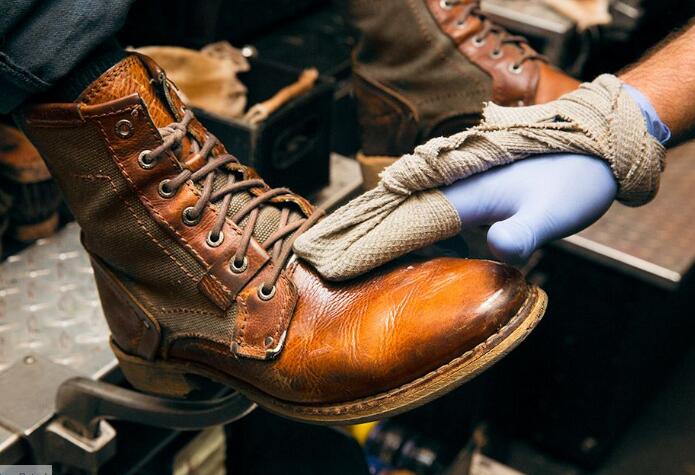
How to Shine Your Shoes
Once a common practice for decades, then a novelty, the (almost) forgotten art of shoe-shining is making a steady comeback. The reason? Kevin Tuohy, founding partner of The Shoeshine Guild, a San Francisco-based drop-off service, thinks it’s because more men are becoming fashionably aware.
Tuohy, a professional shoe-shiner of 20 years, has seen it all — and can trace trends from his back-room shining station. He first picked up the talent while in the army, then he trained in San Francisco, spending years refining his technique. He opened up The Shoeshine Guild,then called A Shine & Co., in 1996 to offer a top-quality shoe-care service that goes above and beyond a mere shine, using the best products on the market. Think day spa, for shoes and boots.
During a visit, Tuohy can identify the type of leather your shoe is made from and immediately prescribe a treatment plan — all before you’re even sitting in the leather wingback with your foot on the shoe rest. Different types of leather require different levels of care, but the basic technique is the same.
How to Shine Boots and Shoes
Step 1: Grab some gloves.
Wearing rubber or latex gloves while doing some serious shoe-shining is extremely important. Some polishes, creams and cleaners that treat leather able to stain your skin, and some have even harsher chemicals, which you definitely wouldn’t want to come into contact with bare skin. So, to be safe, Tuohy recommends you always use protection.
Step 2: Clean your shoes.
You never want to polish a dirty shoe; that’ll just damage the leather further and you’ll end up with an uneven polish. Using Saphir Universal leather balm and a toothbrush, you can scrub any visible dirt off your shoe. A key area to scrub well is the welt, where the sole meets the upper. If not, after you’re done cleaning and polishing your shoes, you’ll find a New Air Force 1 dirty ring around your shoe “like the scum line in a bathtub,” as Tuohy puts it. Once your shoes are as clean as you can get them, use a standard shoe brush to get rid of any excess balm, brushing in quick, back-and-forth motions across the entire surface of the shoe.
Step 3: Know your hide.
For non-porous leathers like shell cordovan leather, you can go straight to waxing, then buff and be done. But for softer, more supple leathers, like calfskin, you’ll want to apply a conditioner. Tuohy uses Saphir Cream (color based on leather) to add color and condition the leather, which makes it look better and feel softer. It also keeps the leather from getting too dry or too wet. Apply some to a cotton rag or old T-shirt and lightly rub it in, in circular motions.
Step 4: Add the protective polish.
For harder leathers, Tuohy would use a wax polish at this stage, but for softer calfskin boots, he uses a Saphir Pommadier cream polish (again, with the color matching the leather pigment). The more porous the leather, the more the cream will take to the leather. And going off that, Tuohy suggests abiding by mantra, “A little goes a long way.” Just a dab or two on a cotton rag should be enough for one boot. Rub the thicker cream in, again in circular motions, this time using a little more elbow-grease.
Step 5: Brush and buff.
Using the brush in a similar way to when you first cleaned off your shoes, brush off any extra cream. At this point, you can add another layer of the thicker cream if you want, and Tuohy recommends that you add small amounts in layers. The more coats, the more protection,Air Jordan 1 Fearless and the more protection, the longer the shine lasts. Tuohy equates it to “folding metal to make a Japanese sword. The more layers, the stronger the sword.”
Step 6: Heat it up and shine away.
Once you’re done adding all the layers of polish you want (usually two layers will do, but extra credit never hurts), take a cotton rag, one end in each hand, and quickly pull it back and forth, dragging it over the leather. This buffing process uses friction to create heat, which better bonds the polish to the leather, creating a finer shine.

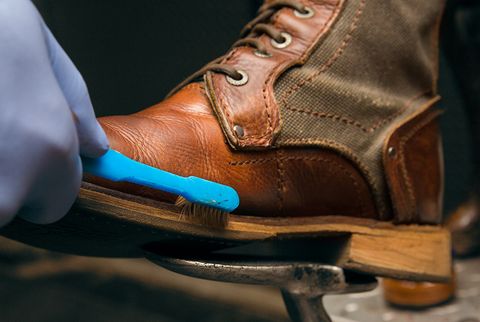
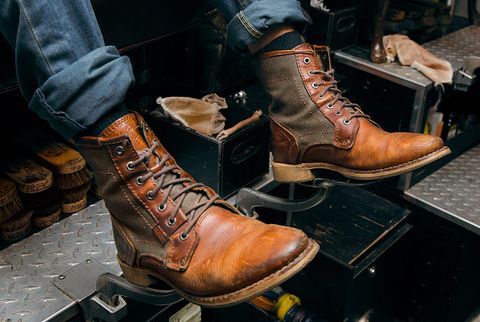

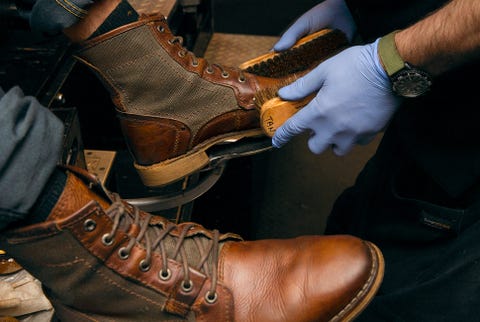
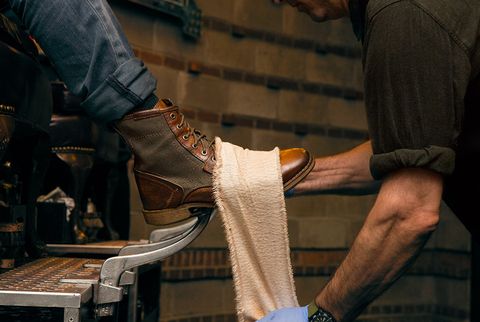
Comments (0)